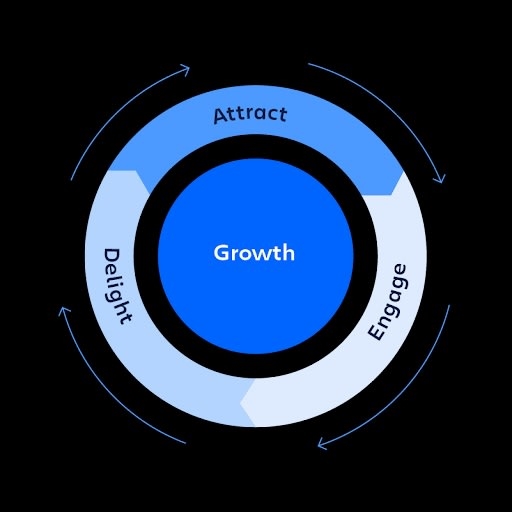6 tips for growing your business with the flywheel model
Whether you’re a startup trying to expand or an established company looking for a more efficient go-to-market approach, the flywheel model is one of the best ways to grow your business. And after nurturing the flywheel model in our business for almost 10 years, I’ve learned a few lessons that I hope you can use to scale—unless you’re one of my competitors. In which case, do the opposite of everything I’m about to say.
The great thing about flywheels is that once you get them going, it takes relatively little effort to keep them moving and build momentum. So I don’t lay awake wondering how we’re going to get the next batch of customers into the sales funnel. A flywheel attracts and engages new customers 24 hours a day.
What is the flywheel model and how can it grow your business?
The fundamental idea behind the flywheel model is that your customers are your best salespeople. If you make them happy, they’ll tell their friends. And if you make your product easy to learn about and purchase, those friends will buy it. Then your new happy customers will tell their friends, and so on. This is drastically different from the traditional enterprise sale process.

It’s a virtuous cycle that has three major phases:
Notice how many times I used the word “easy” there? Reducing friction is key to keeping your flywheel happily spinning and growing your business. Likewise, marketing tactics like SEO, a “freemium” option, or an ever-improving user experience can help your flywheel build more momentum. Here are six of the top lessons I learned:
Just let them buy
Good products sell themselves. All you need to do is get out of the way. And when I say “get out of the way,” that means optimizing for customer self-service. Get rid of gates or other barriers to content about your product. Post your pricing online. Make the purchase process as simple and familiar as ordering from Amazon.
Price for volume and consistency
Every customer should get the same price no matter what. Price your product competitively and stand by it. Discounts train your customers not to take the information on your website at face value. Plus, negotiating special deals takes your team away from doing the type of work that’ll pay dividends over and over.
Treat human interaction as a bug
Every time a one-on-one customer interaction is required, ask why. What information did they need that wasn’t provided? Which transaction were they unable to make on their own? Every customer question is evidence of friction that, wherever possible, should be removed.
Make a lot of friends
By building a global network of channel partners who know the lay of the land, you can avoid establishing your own footprint in every region. Plus, partners can provide the kind of industry-specific expertise you need to efficiently expand into complex markets. We invested in a sales channel program early on that now accounts for a third of our revenue.
And get your customers involved! Providing an online forum for them to ask questions and exchange tips is a low-cost way to keep people engaged.
Apply diverse forces for greater expansion
The more types of force you apply to your flywheel, the more customers you’ll attract. A consumer-focused company might apply forces like spin-off products (Cherry Coke, anyone?), loyalty programs, or influencer marketing. New products or editions of existing products are also well suited for enterprise-focused companies, as are technical services and an ecosystem of add-ons.
Don’t fall into the enterprise trap
When early-stage B2B companies start landing bigger customers, they often prioritize those larger deals, even to the point of letting big customers dictate licensing terms and product roadmaps. This is both logical and tempting. It’s also a trap. Stick to your model, and be willing to forego the customers who don’t respect it. They’ll be more trouble than they’re worth.
One last note: None of this works unless you have a cohesive team with shared values and a shared understanding of the company’s big goals. That’s what keeps you grounded as you grow. Meaningful values keep you focused on working as a positive force in your customers’ lives through every feature you ship, every product you launch, and every dollar you invest.
Cameron Deatsch is chief revenue officer at Atlassian, named a Fast Company “Most Innovative Company.” Atlassian is a developer of collaboration and productivity software mostly geared toward the enterprise market. The company is best known for products like Jira, Confluence, and Trello.
(51)



